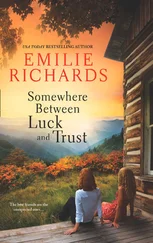“He hasn’t married Christine because she doesn’t like the country, and she doesn’t like us.” Dovey leaned over the quilt, stretched taut on a wooden frame, and squinted at a row of stitches.
Satisfied, she looked up. “Christine Fletcher is a hothouse gardenia, and we’re a wilted bunch of black-eyed Susans. That’s a fact.”
“As if this church isn’t filled with government retirees who have seen most of the world up close and personal.” Cathy fumbled under her chair for the water bottle she always carried and uncapped it for a big swig.
“Maybe so, but those folks came here for the country life and took right to it. Look at you and that husband of yours. Keeping bees, goats...whatever else do you have?”
“Last I heard, Alf was looking for a couple of alpacas.” Cathy capped her water bottle. “Pretty soon I’ll be scared to go out my own door.”
“Was a time not so many years ago in these parts that farming was deadly serious.” Helen looked up from her perfect line of stitches. “And nobody was from anywhere else.”
“Must have been pretty boring,” Cathy said.
Helen humphed, but she supposed not all the changes in Toms Brook, Virginia, were bad ones.
“Back...to...Chris-tine!” Dovey shook her head in disgust. “I swear, this group leaves a subject faster than a hawk swoops off a tree limb.”
Peony glared at her. “What else do you want us to say?”
“Is Sam going to make an honest woman out of Christine or not? And if he ever does, will the two of them be leaving for the big city? Because I don’t think Miss Chris-tine Flet-cher sees herself as a country pastor’s wife.”
“Can you see Miss Christine Fletcher playing the organ or teaching Sunday school?” Anna laughed.
“Well, we need a new sexton,” Dovey said. “There’s dust everywhere. Maybe she scrubs floors?”
Rory chose that moment to streak through the doorway and into the room, skidding to a halt at his mother’s side. The accompanying war whoops woke Bridget, whose whimpers escalated with his shouts.
“Ninjas!” He grabbed Kate’s arm and tugged. “Ninjas! I saw ’em!”
Kate disengaged herself, then turned and put her hands on her son’s shoulders. “You woke up your sister, Rory. How many times have I told you not to shout?”
“Ninjas!” To his credit, the excited little boy tried to lower his voice, but he danced from foot to foot. “A whole truck of ninjas. Two trucks. All dressed in black. They’re coming back!”
“The trucks were dressed in black? Or the ninjas?” Cathy teased.
Rory’s excitement gave way to a frown. “I don’t think I can fight ’em all.”
“Just take them one at a time,” Helen advised. “Tell the others to wait their turn.”
That seemed to make sense to the little boy. He wriggled out of his mother’s grasp and turned back to the play yard. In an instant he had disappeared again.
“When he wins the Academy Award, we’ll all say we knew him when,” Cathy said.
“At least he’s never bored.” Kate got up to rescue Bridget, who stopped whimpering immediately and rested her curly head against her mother’s shoulder. “Maybe I’d better call it a day. I’m not going to get anything else accomplished. Maybe I can get a sitter next week and stay longer.”
Helen rose and stretched a moment. At eighty-three, she was too old to sit in one position for long without turning to stone. “Quilt’s almost done. Martha will like it. Darn shame her mind is going, but at least she still remembers most of us.”
The lap quilt, with appliqued leaves in autumn colors, was to be a gift for Martha Wisner, who had been the church secretary for many years. She had moved into an assisted living facility several years before and was now in the nursing home wing. Martha’s memory was slipping fast, but whatever form of dementia she suffered, she did not seem unhappy. She was always glad to see visitors, whether she remembered them or not. The quilters had chosen the pattern because Martha had loved fall in their Shenandoah Valley. Helen had hand appliqued the top as a reminder of better times.
“If we stay another hour, we can get it finished, then Helen can take it home and bind it,” Anna said. “Unless you want me to do that?”
Helen shook her head. Everybody knew Anna had no color sense. Her stitches were even, points matched perfectly, blocks were square. But Anna’s fabric choices were legendary. Helen was afraid if Anna picked out a binding, the earth-toned leaves would forever be rimmed in shocking pink.
“No, I’ll do it,” she said. “You’re planning to go to that silly Mexican fiesta tonight, aren’t you? I’ve got nothing but time these days.”
“Ninjas!”
This time everybody turned to stare at Rory, who was jumping up and down in the doorway. Before Kate could shush him, there was a crash from the front of the church. The women looked at each other; then, as one, they hurried to the windows overlooking the broad expanse of parking lot that led to Old Miller Road in front of the church.
Teenagers were pouring out of two pickups that were parked within inches of each other. One of the trucks was nose first against an ancient sycamore that anchored the lot. Helen hoped the trucks had collided with each other and not with the tree. As she watched, a group of three boys, dressed in dark jeans and dark T-shirts, started toward the new sign the congregation had erected and blessed that very Sunday, a sign that had already caused its share of controversy within the church community.
One of the boys took a playful swing at the other, dodging and feinting with apparent good spirits. But high spirits or not, Helen didn’t think they were up to any good. They were quickly joined by a fourth boy. That one was carrying a sledgehammer.
“We’d better stop them,” she said. She turned and found her path blocked by a small athletic body.
“Nin-jas!” Rory singsonged. “I—told—you!”
* * *
Elisa Martinez was as accustomed to walking miles every day as she was to the sound of her new name. Weeks passed when the reality of her present life seemed to be the only reality she had ever known. Her legs were strong, and no matter how far she had to walk, she was seldom winded. The name flowed off her tongue, as if she had been born to it.
This morning, though, she was tired and growing discouraged. The Shenandoah Community Church sat on a country road as muddy as it was long. As she had walked Old Miller’s length, she’d skirted so many ditches and puddles she’d probably traveled an extra mile. She had been warned that the previous summer had been dusty and dry, and she should be glad for the rain. She understood rain well enough, but she was learning firsthand the perils of a personal relationship with it.
This morning the air was oppressively humid in preparation for a new storm. The sun was directly overhead, peeking out from coalescing clouds just frequently enough to taunt her. She could see her immediate future. First she would bake, then she would drown. There was little chance she could hike back home from her interview in time to miss the downpour, and she had little protection except a lightweight plastic poncho she carried in a small backpack that doubled as a purse. If the rain started soon, she hoped the church pastor would let her stay inside until the worst of it ended. If it ended.
From the top of the last hill she had glimpsed a steeple, and she knew she was nearly at her destination. She had spent most of the walk trying on “Elisas” for this interview. The stakes were too high to give this less than her best. She needed this job. She could not thank a God she no longer believed in for making it available, but she was grateful that coincidence had gone her way. Now if this brief streak of luck would simply hold.
Читать дальше












